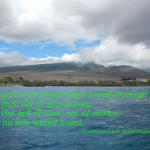Our world is facing a refugee crisis of a magnitude not seen since the Second World War. This presents us with great challenges and many hard decisions. On this continent, too, thousands of persons are led to travel north in search of a better life for themselves and for their loved ones, in search of greater opportunities. Is this not what we want for our own children? We must not be taken aback by their numbers, but rather view them as persons, seeing their faces and listening to their stories, trying to respond as best we can to their situation. To respond in a way which is always humane, just and fraternal. We need to avoid a common temptation nowadays: to discard whatever proves troublesome. Let us remember the Golden Rule: “Do unto others as you would have them do unto you” (Mt 7:12).
– Pope Francis, from his Address to the Joint Session of the US Congress, September 24, 2015
It was a late-autumn afternoon in 2001. I sat in the passenger seat and stared at the highway as Annie, my fellow college freshman, drove. We were on our way to teach a volunteer ESL class at the Hispanic Coalition, a local resource centre for recent Latin American immigrants to the county. Our classes would be informal and one-on-one, which was about as much as inexperienced, 18-year-old me could handle. I felt the knots tightening in my stomach as I slouched into the room. It was full of men – tall and short, old and young, all of them talking loudly. I can’t remember just what these recent arrivals to the US – all of whom worked as day labourers – were doing that evening. Were they huddled around a television watching soccer? Were they shooting pool? I just know they were everywhere, speaking loudly in a language I claimed to understand but didn’t. No one seemed to be in charge.
“Here,” Annie said, pointing toward a back room where more men were sitting at long tables. We sat down, and I timidly introduced myself. A guy in a windbreaker and baseball cap faced me. I couldn’t have guessed his age – 27? 42? I was 18; anyone past college age basically looked the same to me.
“So, what do you want to talk about? What do you want to learn?” I asked in Spanish.
“I want to learn English,” he responded, and I sighed, wondering how I was going to teach him anything useful in these weekly one-hour visits. We started with the basics – “Hello,” “Good morning,” “What’s your name?” Before I knew it our time was up; we shook hands and said goodbye. However, these visits soon became our weekly routine.
“How do you think we’re doing?” I asked Annie – who was one year older than me and infinitely more sophisticated, having lived in Spain with her CEO father – on a ride home after about a month of fumbling through these improvised ESL classes.
“We’re not doing anything,” she said. I glanced at her in surprise.
“What do you mean?”
“We’re not actually helping these people. We’re not organizing or empowering them in any way. We’re not even teaching them English all that effectively.” It was then that the reality of the situation – and our ineffectiveness in it – started to click.
At 18 I knew nothing of immigrants, their needs, and the challenges they faced. But, as my college career went on, I returned to that centre several times; I also taught in an ESL program my university had started for its food service workers. As a student I was timid, afraid to ask them the many questions that were running through my mind. Why had they left home? What were the main challenges they faced in their adopted country? How did they feel about the jobs they did?
As I write this essay today, 8,000 refugees – mostly from Syrian and Iraq – are entering Europe; according to the BBC news, this is the current average number per day. Europe has been plagued with discord as leaders argue about how to deal with the influx of asylum seekers, who naturally present a logistical nightmare. In the US immigration is a major talking point for the upcoming presidential election, with some candidates promising amnesty for all and others asserting that we need a bigger wall. As Pope Francis has said on multiple occasions, the crisis of asylum seekers who don’t make it to safety is a global moral disgrace that needs our response. No matter where we stand on these issues, I am convinced that the first step lies in changing the way we think of these asylum seekers crossing borders – as well as the nations they are so eager to leave and enter.
For the past hundred years at least, scholars in the humanities and social sciences have worked within a rigid paradigm. Methodological nationalism – the assumption that the nation/state/society is the natural social and political form of the modern world – dominates our thinking. On the news, we hear of American issues first. In international diplomacy it is seen as natural that a nation would pursue its own self-interests first. We measure the world economy by looking at the status of each country. We think of cultures as fitting neatly within political borders.
But, of course, they don’t. While empires have been with us since the invention of agriculture at least, the modern nation state is only a few hundred years old. It is an artificial social construct which, as social theorist Benedict Anderson has observed, is constantly reinforced by maps, museums, media and capitalism. Seeing the world as divided into clear national boundaries, assuming a one-to-one correspondence between nation, state and culture, we forget many things. What about those who inhabit the border? What about differences within a nation? What about the consequences of colonialism and postcolonialism? What about migration and diaspora?
During my graduate studies at University of Toronto I had the opportunity to work for an academic program in diaspora and transnational studies – an interdisciplinary area of study that looks at the world from the perspective of those who have moved, whether voluntarily or not. Instead of seeing the world as a rigid map with clear national borders, we learned to think of it as a flight map whose contours were fluid and uncertain. Instead of viewing culture as rigidly contained within a set of politically determined confines (often constructed under colonialism), we came to see it as fluid and transnational.
Changing our perspective in this way will not provide the much-needed political solutions to the current migration crisis, but it may help us to relate in a more empathetic way to the millions of people who are on the move throughout the world, particularly when we encounter them in our own communities, to view their cultures with curiosity rather than fear, to let them know they are welcome in this fragile world we share. As Kenyan-born Somali poet Warsan Shire writes in her poem “Home,”
no one leaves home unless
home is the mouth of a shark
you only run for the border
when you see the whole city running as wellyour neighbors running faster than you
breath bloody in their throats
the boy you went to school with
who kissed you dizzy behind the old tin factory
is holding a gun bigger than his body
you only leave home
when home won’t let you stay.no one leaves home unless home chases you
fire under feet
hot blood in your belly
it’s not something you ever thought of doing
until the blade burnt threats into
your neck
and even then you carried the anthem under
your breath
only tearing up your passport in an airport toilets
sobbing as each mouthful of paper
made it clear that you wouldn’t be going back.you have to understand,
that no one puts their children in a boat
unless the water is safer than the land
no one burns their palms
under trains
beneath carriages
no one spends days and nights in the stomach of a truck
feeding on newspaper unless the miles travelled
means something more than journey.
no one crawls under fences
no one wants to be beaten
pitiedno one chooses refugee camps
or strip searches where your
body is left aching
or prison,
because prison is safer
than a city of fire
and one prison guard
in the night
is better than a truckload
of men who look like your father
no one could take it
no one could stomach it
no one skin would be tough enoughthe
go home blacks
refugees
dirty immigrants
asylum seekers
sucking our country dry
niggers with their hands out
they smell strange
savage
messed up their country and now they want
to mess ours up
how do the words
the dirty looks
roll off your backs
maybe because the blow is softer
than a limb torn offor the words are more tender
than fourteen men between
your legs
or the insults are easier
to swallow
than rubble
than bone
than your child body
in pieces.
i want to go home,
but home is the mouth of a shark
home is the barrel of the gun
and no one would leave home
unless home chased you to the shore
unless home told you
to quicken your legs
leave your clothes behind
crawl through the desert
wade through the oceans
drown
save
be hunger
beg
forget pride
your survival is more importantno one leaves home until home is a sweaty voice in your ear
saying-
leave,
run away from me now
i dont know what i’ve become
but i know that anywhere
is safer than here
















